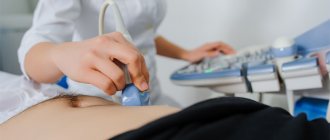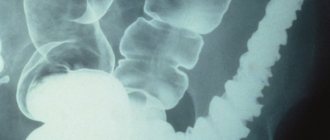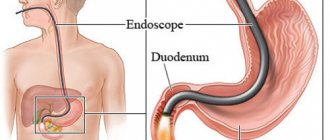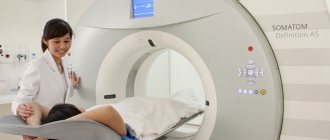Share information with your Facebook friends
VK
Preparing for a colonoscopy is the most important stage in the effectiveness of the procedure itself. Since adequate preparation for colonoscopy makes it possible to examine the entire surface of the intestine for the smallest changes (up to 1 mm). What is hidden from view by the liquid contents can be evacuated through the endoscope channel. If solid components remain in the intestine, then there is a high risk of missing any lesions under these solid components of the intestinal contents. Today, the recommendation of all European and American endoscopic communities is a two-stage (two-day) split preparation.
Preparation for a colonoscopy can be either excellent (there is free or a small amount of clear yellowish fluid in the intestinal lumen) or good (in the intestinal lumen there is a small amount of turbid yellowish fluid).
Preparing for a colonoscopy.
What you can eat before the examination:
- For two days, exclude the intake of foods rich in fiber - vegetables, fruits with skin, berries with small seeds and grains, bread, mushrooms, cartilage, etc.
- The day before the examination, take only liquid food (transparent meat and vegetable broths, jelly and juice without pulp (except beetroot and black currant), black and green tea (except hibiscus and fruit)
- The day before the study at 16-00 the last meal of liquid food
Menu: slag-free diet
Preparation for a colonoscopy involves prescribing a special slag-free diet 3-4 days before the examination. It includes drinking plenty of water and limiting foods that cause fermentation and flatulence. Also, 4-5 days in advance you need to give up foods that can damage the intestinal wall, for example, berries with seeds.
The patient should drink up to 3 liters of water or other liquid per day. Recommended drinks include fermented milk products, fruit juices diluted with water, and weak tea (black or green). You should not put sugar in tea, but you can eat 1 spoon of honey per day.
Before the examination, you can eat dietary meat (chicken, rabbit, veal, lean beef), lean fish, buckwheat or rice porridge (with water or milk), white bread, cottage cheese, and some fruits are acceptable (as recommended by your doctor). The food before the examination should be easily digestible, the last meal should be in the evening of the day before the examination. On the day of the examination, small amounts of water are allowed, but it must be stopped 1-2 hours before the procedure.
The diet for preparing for colonoscopy is called slag-free, since it involves excluding from it foods that form a large amount of feces and gases in the intestines.
It is necessary to exclude legumes, mushrooms, yeast baked goods, and carbonated drinks from the diet. Before a colonoscopy, you should not eat fatty foods or overeat. The amount of liquid consumed should be checked with a doctor - in some cases, restrictions are also imposed on water consumption.
Read more about “Slag-free diet before colonoscopy” sample menu for 4 days
For preparation, we recommend two drugs to choose from:
MOVIPREP
- The evening before the study from 18 to 20 pm: 1 large bag + 1 small bag + 1 liter of water
- 1 liter of water
- 1 large bag + 1 small bag + 1 liter of water
FORTRANS
(if the stool is regular or pasty, daily)
- The day before the study, from 18-00 to 20-00, dilute and gradually drink (200.0 ml at intervals of 5-10 minutes) the solution: 2 packets of Fortrans per 2 liters of drinking water. There will be a loosening of the intestines
- On the day of the study, 5 hours before the test, dilute 2 packets of Fortrans in 2 liters of drinking water and gradually drink (200.0 ml at intervals of 5-10 minutes) over the next two hours. There will be a loosening of the intestines, which will disappear over the next 3 hours until the wash water becomes light yellow. Must be located near a sanitary area.
Relative contraindications to intestinal colonoscopy
Relative contraindications for colonoscopy will be the physical condition of the patient, determined by the doctor, which during intestinal colonoscopy will not be able to bring the desired result from this procedure. Such contraindications include:
- the patient has intestinal bleeding: accumulation of blood in the large intestine and abdominal cavity makes visual inspection of the condition of its walls and mucous membrane impossible;
- the patient has recently undergone abdominal surgery - during colonoscopy, unhealed sutures may be damaged;
- the patient has diverticulitis - this pathology is characterized by severe protrusion of the intestine, which makes it impossible for a colonoscope to pass through the colon and adequately examine it;
- the patient has an artificial heart valve - colonoscopy for this contraindication should be temporarily postponed until the end of antibiotic therapy to completely exclude infection in the valve;
- the presence of an inguinal or umbilical hernia: an intestinal loop may fall into it, which will complicate the passage of the endoscopic device.
Little tricks (for Fortrans):
- To improve the taste of the solution, you can cool it by placing it in the refrigerator the evening before the test.
- To improve the taste of the solution, you can dilute 1 packet with 900 ml of water + 100 ml of freshly squeezed orange or lemon juice without pulp and zest.
- It is recommended to drink clean water, which should be stopped three hours before the procedure. After this, any drinking before the procedure is not recommended.
- Drink one glass every 15-20 minutes until you have drunk the entire recommended 3-liter volume. You can take a break every hour during this process. And it is advisable to distract yourself with some household chores.
Virtual colonoscopy
Virtual colonoscopy is a relatively new research method that allows you to obtain images of the intestinal walls using computed tomography.
As before a regular colonoscopy, before a virtual colonoscopy, the patient’s intestines must be well cleaned of feces (see below).
To obtain a clear image, before starting the procedure, doctors use a special probe inserted into the anus to fill the patient’s intestines with air.
Compared to conventional colonoscopy, virtual colonoscopy is even less traumatic and allows you to very accurately determine the size and location of altered areas of the intestine.
Significant disadvantages of virtual colonoscopy include its high cost, the inability to obtain tissue samples during the examination (because of this, doctors may prescribe a regular colonoscopy after a virtual colonoscopy), as well as discomfort and abdominal pain caused by air introduced into the intestines.
NOTE!
The drug of choice for preparation for colonoscopy is FORTRANS if:
- the patient is taking drugs from the group of angiotensin-converting enzyme inhibitors (Ace Inhibitor, Akf-Inhibitor), such as Convertin, Captopril, Capoten;
- drugs of the angiotensin receptor blocker group, such as Atacand, Oksaar;
- there is renal failure;
- heart failure;
- have diabetes mellitus;
- symptoms that suggest nonspecific diseases of the large intestine (Crohn's disease, UC).
Properly cleanse the intestines before undergoing FCS
By following the instructions of specialists on how to properly prepare for a colonoscopy at home, you can achieve maximum colon cleansing. Is it necessary to do enemas before a colonoscopy or is it not necessary? It all depends on the individual preferences of the patient and his state of health. Two methods are used - enema or cleansing with medications, and each of them has a list of contraindications. A specialist will tell you which is better.
Enema before colonoscopy, is it necessary to do it and how to give an enema correctly
How to properly do an enema before a colonoscopy? For an enema you need to use an Esmarch mug. The manipulation is done twice with an interval of 1 hour in the evening after the last dinner and the next morning when a colonoscopy is scheduled. Sequence of enema:
1 prepare 2-2.5 liters of water in an Esmarch mug (preferably boiled, cooled to room temperature);
2 lubricate the tip of the tube with Vaseline;
3, taking a knee-elbow position, carefully insert the tip into the anus, first releasing the air so that it does not enter the intestinal lumen;
4 try to breathe deeply, this way the water flows in more easily;
5, when the urge to empty occurs, you can turn off the flow of incoming water and squeeze the buttocks with your palm, and then resume the procedure until all the water is used.
6 lie down for about 10 minutes, lightly massaging the abdominal area clockwise.
7 go to the toilet.
After the second enema, you should feel that the intestines are completely empty. After morning enemas, clear water should come out of the intestines. There are a number of contraindications for an enema (the presence of inflamed hemorrhoids, a bleeding fissure), so you need to consult a doctor.
Colon cleansing before colonoscopy with drugs, tablets, medicines
Not all patients can do an enema on their own, and when the administration of a large volume of liquid causes severe discomfort, they prefer a convenient and quick cleansing procedure using medications. What medications do doctors give to cleanse the intestines before a colonoscopy? Let's consider the effect of the most commonly used means:
1 Fortrans for bowel cleansing before colonoscopy. Doctors most often recommend the drug Fortrans before colonoscopy and on the eve of operations. The powder is dissolved in the volume of water specified in the instructions (1 packet per approximately 20 kg of body weight) and taken in 2 doses, the night before and the next morning, 4 hours before the colonoscopy. To prevent an attack of nausea, add a slice of lemon to the solution. You can divide the entire portion of the solution into several doses, drinking about 200 ml every hour, counting the time from the middle of the day preceding the day of diagnosis.
2 Duphalac to quickly cleanse the intestines. Before the colonoscopy procedure, Duphalac gently acts on the intestinal walls, releasing everything unnecessary from them. The convenient form of release in syrup allows you to quickly prepare the desired solution from 2 liters of water. If you feel bloating, it is recommended to take Espusin or Espumisan.
3 Lavacol to cleanse the intestines of feces and stagnation in it. Works like other cleansing laxatives. The powdered drug is dissolved in warm water and drunk at intervals of 30-40 minutes on the day preceding the day of diagnosis.
4 Flit phospho-soda before colonoscopy. An osmotic laxative that cleanses the intestinal cavity well. Two doses of the drug, according to the instructions, should be taken the evening before the diagnosis and the next morning.
5 Endofalk to cleanse the intestines before colonoscopy. The indications for use of the drug clearly indicate preparation for colonoscopy. To achieve the maximum cleansing effect, you need to drink at least 3 liters of a solution prepared from the powder, dividing the total dose into evening (up to 2 liters) and morning doses.
Attention! If you feel that the intestines are not cleansed enough, it is possible to reschedule the procedure. You need to notify your doctor.
What to do after a colonoscopy FCC
After performing a colonoscopy, the patient can return to his usual diet, but gradually. There is no need to immediately load the gastrointestinal tract with heavy and difficult to digest food. If you feel bloated, it is helpful to take activated charcoal. If there is severe spasm, doctors recommend taking antispasmodics.
Patients are worried about how often they need to have a colonoscopy? If there are alarming symptoms in the intestines, it is recommended to undergo diagnostics annually. Colonoscopy is not a pleasant procedure, but it is a diagnostic method that is highly informative and accurate, which in many cases makes it possible to identify precancerous lesions of the colon.
NOTE!
- If the patient is taking anti-clotting drugs such as Aspirin, Cardiomagnyl, Plavix or NSAIDs, they are at risk of bleeding, although small. Therefore, the possibility of interrupting this treatment should be discussed. However, if taking these drugs is necessary (for example, if the patient has had a stroke or if a cardiac stent has been inserted within the last 6 months), it is recommended to consult a cardiologist or neurologist or blood clotting clinic regarding the risk associated with interruption in treatment.
If these medications are used only as a preventive measure, you are advised to stop taking them about a week before the procedure.
- Patients taking Coumadin are at high risk of increased bleeding if a biopsy is performed and a polyp is removed during the procedure. Therefore, it is recommended to interrupt treatment with this drug approximately a week before the procedure and consider the possibility of replacing it with Clexane. In this case, a blood test (clotting study) should be done the day before the procedure. You should also stop taking Clexane approximately 12-24 hours before your procedure.
- Patients taking orally (orally) iron supplements (Venofer | Maltofer fol | Totema | Ferlatum | Fenyuls | Ferinject | Ferroceron | Ferroplex | Ferronal | Ferrocal | Conferon | Tardiferon | Sorbifer) to compensate for anemia, should discontinue these medications 3 days before before the procedure.
print version
TagsColonoscopy Endoscopy
When is the procedure recommended for a patient?
The intestines are a very important element; water and nutrients are absorbed here and unnecessary things are eliminated. The organ contains microflora, which makes up an impressive part of the immune defense. The intestines are constantly busy and work 24 hours a day. Considering the bad habits and poor nutrition of modern man, he is constantly exposed to strong negative influences. Therefore, organ diagnosis is very important for preventive purposes. In addition, there are a number of indications for colonoscopy when the procedure is strongly recommended for the patient:
- An ultrasound or MRI revealed a tumor or other formation;
- Crohn's disease is suspected;
- Nonspecific ulcerative colitis is present;
- A stool test detected occult blood;
- Partial obstruction, which manifests itself in the form of ribbon stool or complete blockage of the lumen of the organ;
- Biopsy of large tumors before surgery.
In addition to diagnostics, colonoscopy is prescribed for surgical treatment of the following problems:
- Removal of intestinal polyps;
- Elimination of sources of bleeding using coagulation;
- Correction of the normal position of the organ during intestinal volvulus;
- Restoring patency;
- Removing hardened stool.
The following symptoms may be an indication for a colonoscopy:
- Regular intestinal colic with intense pain of a cramping and cutting nature;
- Discharge of mucus and blood from the anus;
- Severe bloating that occurs regularly;
- Lack of normal bowel movements, instead constipation or diarrhea;
- Loss of body weight;
- Iron-deficiency anemia;
- Cases of cancer and other tumors in close relatives;
- Intestinal pathologies that are not detected by other diagnostic methods;
- Symptoms of general inflammation of unknown origin.
Attention! For preventive purposes, colonoscopy is indicated for all patients over 50 once a year.











